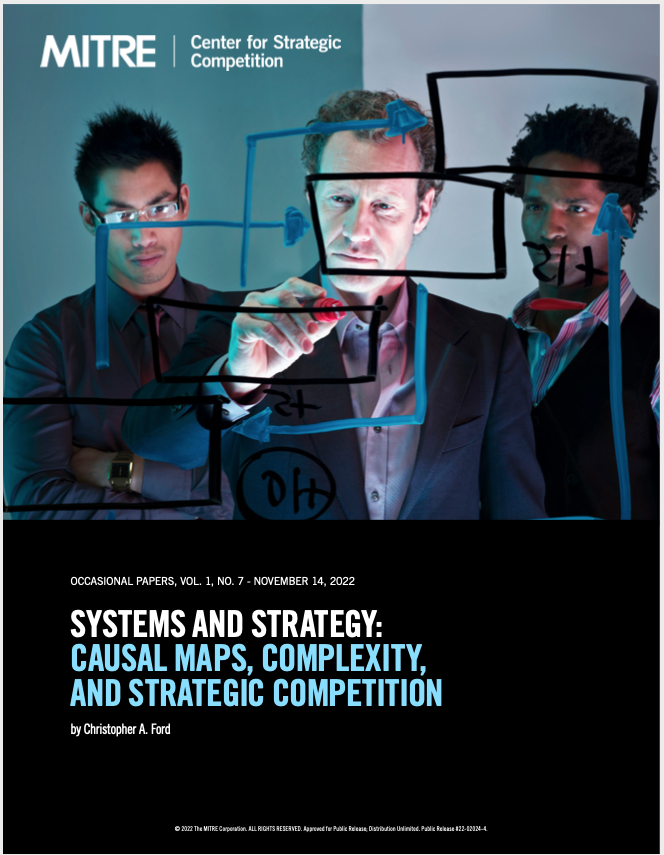Systems and Strategy: Causal Maps, Complexity, and Strategic Competition
MITRE's Center for Strategic Competition (CSC) published its seventh Occasional Paper on November 14, 2022. Written by Dr. Ford, it describes some of the ways in which the CSC has been working to develop approaches to understanding decision making through the prism of Complexity Science, and offers an illustrative hypothetical example of how such methods can enrich policymaking. The paper can be found here, or can be downloaded by using the button below.

From the Executive Summary:
“In developing and implementing an effective ‘whole of nation’ (WON) response to the WON challenges we face in the modern world, such as those presented by China’s full- spectrum competitive strategy, it is essential to provide U.S. and other Western leaders with the holistic situational awareness, ‘systems’-informed analysis, and cross-jurisdictional policy coordination that a genuinely ‘comprehensive’ national strategy—and strategic ‘campaigning’—requires. China’s effort to create what might be called a ‘leverage web’ of mutually-reinforcing instruments of power and influence confronts U.S. leaders with a genuinely systemic problem of long-term competitive strategy. Yet the U.S. Government is presently not well organized to meet this challenge ....
“We need much more sophisticated ways to assess and describe our strategic environment, to understand key patterns and dynamics therein that affect U.S. interests—including the systemic patterns that can be generated by and within complex systems—to evaluate possible courses of action (COAs) in response to developments, to identify ways to wield coordinated levers of national power in response to strategic challenges, to monitor the impact of policy interventions upon that environment, and to repeat such analysis and COA evaluation on a timely and iterated basis so as to ensure that U.S. responses fit the situation. ...
“The MITRE Corporation’s Center for Strategic Competition has been working to develop and refine methodologies to help: (1) find ways to aggregate the input of multiple Subject Matter Experts (SMEs) in a scalable way through the construction and aggregation of causal maps; and (2) understand such causal maps in ways that identify characteristic patterns therein in order to focus policy deliberations upon the development of effective interventions designed to break, impede, or nudge such systemic dynamics
in more salutary directions. This approach allows a considerable degree of complexity to be intelligibly captured, while yet permitting one to
‘unpack’ advice given on the basis of such maps in detail, allowing leaders to assess its plausibility, identify its underlying assumptions, spot the areas of relative consensus or contestation encoded therein, test counterfactuals against received wisdoms, and explore the merits and demerits of alternative policy interventions in a rigorous and systematic way. Using such tools, it is also possible to discern and visualize the most significant sub-system interrelationships in a complex system such as that of People’s Republic of China (PRC) global strategy. Identifying characteristic configurations and the dynamics that may lie behind systemic behavior can help open up important new insights into strategy and possibilities for policy interventions. ....”








